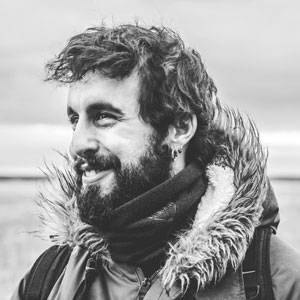
Pablo Cabezas
PhD
pablo.cabezas@rai.usc.esResearch area: Zebrafish Xenograft
Pablo Cabezas Sainz, born in Lugo in 1990, completed his Bachelor's degree in Biology at the University of Santiago de Compostela in 2013. In 2014, he commenced his doctoral studies in Molecular Medicine. Initially, he secured a two-year fellowship from Fundación Ramón Domínguez (IDIS) for his Ph.D., which was later replaced in 2016 by a three-year fellowship from Xunta de Galicia to complete his research. During this period, he combined a short research stay grant from Xunta de Galicia, associated with the Ph.D. grant, with a private grant from Fundación Pedro Barrié de la Maza. This allowed him to spend six months in Leiden, Netherlands, enhancing his skills in xenotransplantation techniques under the supervision of Prof. Ewa B. Snaar-Jagalska.
Throughout his Ph.D., he concurrently gave genetics classes at the University of Santiago de Compostela for the three years of the Xunta de Galicia grant, honing his communication skills. Pablo successfully defended his Ph.D. in Molecular Medicine in 2019, achieving the highest qualification, 'Cum Laude,' for his thesis titled 'HCT116 colorectal and MCF7 breast cancer cell lines xenografted into zebrafish embryos give insight into the importance of microenvironment in tumor growth and metastasis for a future use of the model in clinical research.' His work was conducted under the supervision of Prof. Laura Sánchez, Dra. Laura Muinelo, and Dr. Rafael López.
During his Ph.D. in Lugo and his stint in Leiden, Pablo acquired proficiency in various techniques. The focal point of his Ph.D. was the xenotransplantation technique in zebrafish. Additionally, he gained expertise in stereomicroscopy, confocal imaging, image analysis and quantification using different software, cell culture, compounds toxicity, and basic molecular techniques such as PCR and qPCR. Due to the collaborative nature of the xenograft technique, Pablo developed a comprehensive understanding of the cancer field, engaging in projects with diverse groups spanning various disciplines and cancer types, providing valuable in vivo models for assays.
Following his Ph.D., Pablo secured a Postdoctoral Grant from Xunta de Galicia, enabling him to work as a PostDoc in Porto for two years. At that time, he was engaged in his PostDoc project, 'HNF4a and HNF1a biological implications in Type II Diabetes and Pancreatic Cancer,' at the i3S institute (Instituto de Investigação e Inovação da Universidade do Porto) within the Vertebrate Development and Regeneration group led by Dr. Jose Bessa. During this period, Pablo addressed gaps in his knowledge from his Ph.D. by learning the CRISPR/Cas9 technique in zebrafish, along with related molecular techniques such as ChIP-Seq, RNA-Seq, ATAC-Seq, 4C, or Hi-Chip, and the corresponding bioinformatic analyses.
Post this period, he returned to the University of Santiago de Compostela, continuing his work on the project for one year, with the potential to apply for a two-year funding to initiate his independent research line in the Nutrigenomics in Cancer research field.
During this time, Pablo obtained an Assistant Professor position in the Phisiology Department, balancing his research projects with his teaching duties and the supervision of several final degree projects, master projects and his Ph.D student.
Pablo's contributions to the scientific community are encapsulated in 20 peer-reviewed articles, primarily in Q1 cancer research journals with impact factors ranging from 3.5 to 20, including journals like Scientific Reports, Oncogene, and Nature Communications. His work averages nine citations per year, totaling 44. Additionally, he has presented numerous research posters and delivered oral presentations at national and international congresses, such as the AACR (American Association for Cancer Research).